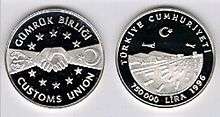European Union–Turkey Customs Union
| Economy of Turkey |
|---|
 |
| Economic history of Turkey |
|
Stock Exchange |
|
|


On 31 December 1995, a 6 March 1995 Decision of the EC-Turkey Association Council, established by the Ankara Agreement, to implement a customs union (Turkish: Gümrük Birliği) between Turkey and the European Union, came into effect.[1] Goods may travel between the two entities without any customs restrictions. The Customs Union does not cover essential economic areas such as agriculture (to which bilateral trade concessions apply), services or public procurement.
In 1996 a free trade area was established between Turkey and the European Union for products covered by the European Coal and Steel Community. Decision 1/98 of the Association Council covers trade in agricultural products.
In addition to providing for a common external tariff for the products covered, the Customs Union foresees that Turkey is to align to the acquis communautaire in several essential internal market areas, notably with regard to industrial standards.
Results for Turkey
Turkey's main exports to EU and imports from EU are dominantly industrial (95% of all its imports and exports).[2] Since 1996, Turkey's gross domestic product has increased 4-fold, making it one of the fastest growing economies in the world. At the same time, however, the foreign trade deficit of Turkey (between EU) has increased 2 fold and 6 fold with non-EU countries (the rest of the world), between 1995–2008. The Customs Union is a large factor in both of these developments. Some commentators have pointed to a vicious circle that the profits generated from imports are being used to buy raw materials and assembly parts again from Europe. This shows that Turkey is dependent on European raw materials and parts.[2]
Some argue that the customs union treaty is quite like the Capitulations of the Ottoman Empire.[3] It was giving economical and political powers to a union (EU in this case) which the signing party (Turkey) was and still is not a member:
- Turkey, by accepting the customs union protocol, was giving the EU the power to manipulate the foreign relations of Turkey. Turkey was accepting all the treaties between EU and any non EU country (i.e. all the other countries in the world) by precondition. (16th and 55th articles[4] )
- Turkey, by entering to the customs union, was accepting not to do any treaties with any non-EU country without the knowledge of EU. Otherwise, EU had the right to intervene and annul that treaty. (56th article[4])
- Turkey, by entering to the customs union, was unconditionally accepting to make laws which are parallel to the newer laws made for the customs union by EU. (8th article[4])
- Turkey, by entering to the customs union, was agreeing to accept all decision of the European Court of Justice, on which there is no Turkish judge, insofar as the customs union decision is identical to EU law, but the tribunal is independent of the ECJ. (61st-64th article[4][5])
- Turkey, by entering to the customs union, was opening its own market to European goods. The domestic goods of Turkey were in a great difficulty to compete against these due to a difference in quality. The European goods would flow into Turkey without any customs fee.
As Turkey is in a customs union with the EU, it has to adjust its tariffs and duties to match those of the EU. However, the free trade agreements (FTAs) signed by the EU do not extend to Turkey, so the EU's FTA partners can export to Turkey tariff-free, while maintaining tariffs on Turkish goods, unless they also conclude an FTA agreement with Turkey. During the negotiation of the Transatlantic Trade and Investment Partnership (TTIP), Turkey raised the prospect of leaving the customs union over the economic contraction it would suffer as American goods would enter Turkey tariff-free and Turkish goods would continue to face American tariffs. The EU and Turkey are in negotiations for amending the customs union agreement to add Turkey to the EU's present and future FTAs.[6][7][8]
Full European Union membership
Turkey has been an associate member of the European Community (EC) since 1964, following the signing in 1963 of the Ankara Agreement (EEC-Turkey Association Agreement (1963)) with the EEC. Turkey applied for full membership on 14 April 1987.
The decision to consider Turkey's application was deferred until 1993, because the European Community was in the process of becoming the even (politically and economically) tighter European Union. The fall of the Soviet Union and German reunification delayed the decision on Turkish membership even more. During those years the European Community had also become reluctant to consider Turkey's application.
At the Helsinki summit in December 1999 Turkey was given the status of a candidate country. At the end of 2004, the European Commission has issued a report with positive recommendations to the European Council, indicating the degree of compliance by Turkey of the Copenhagen political criteria. On this basis, the European Council has decided to start accession negotiations with Turkey on 3 October 2005.
Euro-Mediterranean free trade area
Finally, Turkey is also member of the Euro-Mediterranean partnership and as such is interested in concluding free trade agreements with all other Mediterranean partners, with a view to the creation of a Euro-Mediterranean free trade area, originally aimed for by 2010.
See also
References
- ↑ European Commission : Trade : Turkey
- 1 2 Kalaycı, Cemalettin; Seyfettin Artan (17 June 2009). "The Impact of a Customs Union on Turkey's Foreign Trade" (PDF) (in Turkish). Eskişehir, Turkey. pp. 15–17. Retrieved 19 September 2012.
- ↑ Metin, AYDOĞAN. "AVRUPA BİRLİĞİNİ YARATAN NEDENLER VE TÜRKİYE" (PDF) (in Turkish). Retrieved 22 May 2013.
- 1 2 3 4 "1/95 Sayılı Ortaklık Konseyi Kararı ( Gümrük Birliği Kararı )" (in Turkish). Retrieved 3 October 2012.
- ↑ "EUR-Lex - 21996D0213(01) - EN". eur-lex.europa.eu. Retrieved 2016-12-19.
- ↑ http://www.europeanpublicaffairs.eu/the-eu-turkey-customs-union-in-the-light-of-ttip-and-beyond-the-economic-relations/
- ↑ http://www.dailysabah.com/business/2016/08/30/talks-between-turkey-eu-to-update-customs-union-deal-to-start-in-2017
- ↑ http://www.al-monitor.com/pulse/originals/2015/05/turkey-trade-victory-transatlantic-investment-partnership.html
